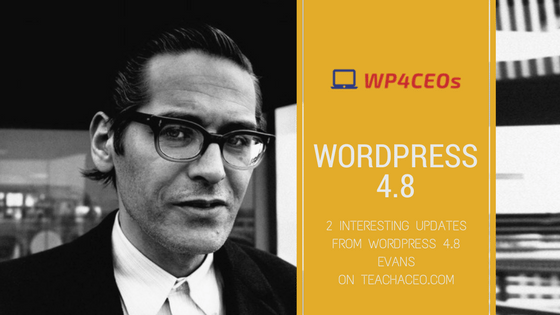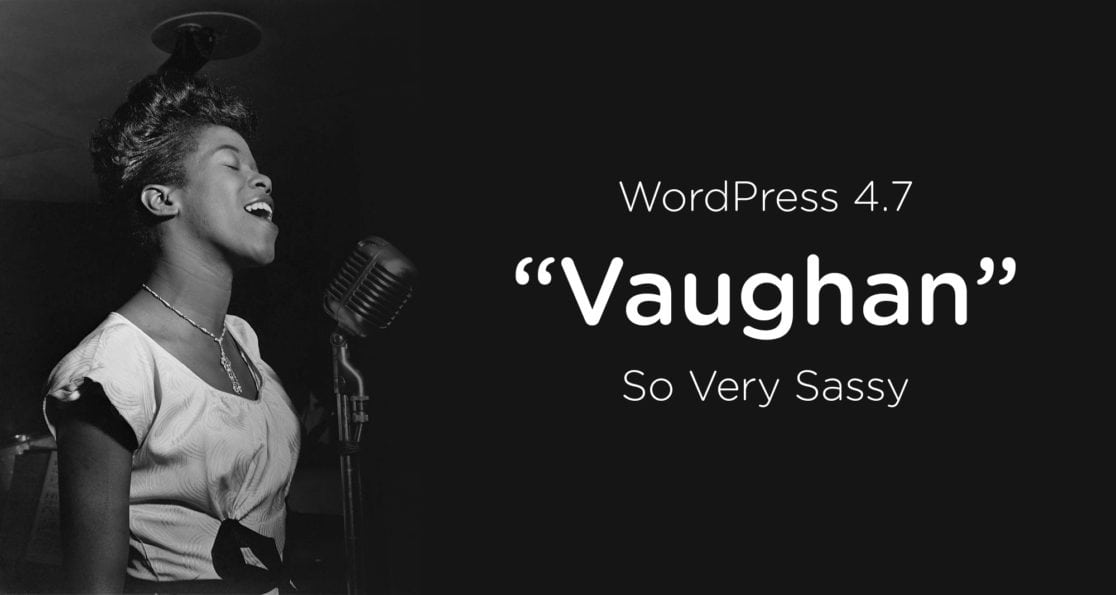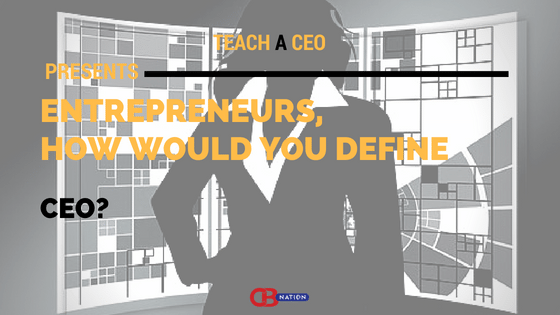As a business leader, you perform many roles especially in the case of a start-up. In the early stages of establishing the business, it's success lies in your effort. However, as the business grows, you incorporate team members who help you run the business. It's for this reason that different people have diverse ways of defining the term CEO. We asked entrepreneurs and business owners their definition of the word CEO and here's what they had to say;
#1- Chief Vision Officer

Jeremy Ryan Slate
I look at the CEO as the Chief Vision Officer, they are the one that has to put the company vision together. They know where they want to steal the ship and help to foster an environment that helps others to do the same; it’s so important to help enable those in your business to be successful by helping them to see that vision. In that same way, I have been responsible turning down some opportunities because they do not fit with current company or brand vision and where you want to go. The integrity of purpose of a company is so important to put a future there; I see that as the modern role of the CEO.
Thanks to Jeremy Ryan Slate, Command Your Brand Media!
[divider]
#2- Chief Everything Officer

Sometimes to understand a term, it’s easier to start with what it isn’t. CEO isn’t a Chief Everything Officer. A common mistake among entrepreneurs who are CEOs is to wear too many hats. They often gravitate toward the core competency that turned them into entrepreneurs to begin with, be it product, marketing, sales or anything else. However, by doing so they are bound to neglect the one thing they should be doing as CEOs – to ensure that all the stakeholders are acting in concert towards a well-defined set of outcomes. They should delegate everything else.
Thanks to Rafi Zikavashvili, Pramp!
[divider]
#3- Fiercest defenders of the company mission

CEOs are the fiercest defenders of the company mission — always doing our best to properly disseminate where we've been, where we are, and where we're going to the highest levels of management all the way down to entry-level employees. Every decision we make is geared toward improving customer, employee, and shareholder (if applicable) satisfaction, and that is primarily accomplished through clear, concise communication and unceasing encouragement. Our job revolves around fitting the right talent to the right problems and then stepping back to observe the magic of teamwork.
Thanks to Drew Sementa, Tidal Commerce!
[divider]
#4- Main leader

Traditionally, the CEO is considered the top executive in the company responsible for a firm's overall operations and performance, is the main leader of the firm, and serves as the liaison with the board. While this is still mostly true, it seems recently some transformation in the expectations from the market and internally took place. A more modern version of the role of the CEO departed a bit from the operations, the top chief is expected rather to be the long-range technology visionary as well as the chief PR representative for the company's brand. In fact, a company's brand these days is strongly tied to the personality and performance of the company's CEO. There is an intangible but powerful impact of the brand equity associated with the persona of the CEO. Think Elon Musk of Tesla (exceptional performance) or Travis Kalanick of Uber (massive damage to the brand equity resulting in decreased market share). For companies it presents a unique challenge as their CMOs must invest and develop two separate, yet completely connected brands – one of the company itself, and one of the CEO, its chief representative. I don't believe it necessarily makes the CEO a Sales person; but it does, in a way, make it a two-headed dragon for the company's marketing and advertising.
Thanks to Inga Romanoff, Romanoff Consultants!
[divider]
#5- Coordinator and manager

The Chief Executive Officer (CEO) oversees the entire operation of an organization or a firm. A CEO is responsible for coordinating effective
marketing, financial, operating, cultural and legal strategies that maximize the shareholder's (owners) value. In very small companies, especially start-ups, the CEO does mostly everything. As organizations get bigger, CEOs have to delegate duties to subordinates, and make sure that they are carried out efficiently. A CEO doesn't need to micromanage a company for it to be successful, but a CEO does need to be a good leader!
Thanks to Amna Rizvi, LiveScience.Tech!
[divider]
#6- So many hats
The CEO of a business has to be a lot of everything — a visionary, a thought leader, and most importantly a motivator. Always with their eyes on the horizon but feet in the pool. With a strong vision, the CEO is the person who is able to understand the details of where a company is today to carve the path to a successful future. This means tough decisions across the board – from financial capital to human capital. A CEO’s success really relies on hiring the right people who can articulate, grow and realize the vision.
Thanks to Kendra Frisbie, DECASO!
[divider]
#7- The conductor of the orchestra

The CEO conductor doesn't play an instrument, but carries full responsibility for ensuring the group delivers beautiful music. They set a vision of success in advance, coordinate the various teams (percussion, brass, woodwinds, strings etc) to play well together, and listen and adjust on the fly as needed.
Thanks to Christopher Arnold, Trebuchet Group!
[divider]
#8- A leader

A CEO generally speaking, is the leader of an organization in many respects. He or she is the #1 executive in the firm, and serves as a conduit between the board of directors and basically the rest of the business. He or she is usually solely held responsible for the firm's success, growth, and profits. That person is also normally involved with the creation and implementation of all company policies.
Thanks to Andrew Schrage, Money Crashers!
[divider]
#9- A number of things

I approach being a CEO with basic common sense, experience and intuition: Live by the golden rule (treat others as you would like to be treated). Focus on people's strengths and not their weaknesses. Expand in down cycles. The more people tell you that you're crazy, the more you know you're on the right track. Good CEOs accept change well. Great CEOs create change. At the end of the day, all that a CEO really does is act as a visionary and attract people to share and execute that vision. That, in a nutshell, is my job description.
Thanks to Robert Tillis, Imperial Dade!
[divider]
#10- Teamplayer

I believe CEOs are, and should be, team players. They commit when it comes to success of their business and are ready to roll up their sleeves and work hard alongside their team members to contribute and be all in together. Teamwork makes the dream work!
Thanks to Deborah Sweeney, MyCorporation.com!
[divider]
#11- Circus ringmaster

I’d define a small business CEO like being a circus ringmaster. I have dozens of things happening at once. Hourly and daily. From sending products out to consumers to posting on my blog. Some need my immediate attention, others can wait. So, to deal with the daily tasks and incoming, I have created a task list, things that I need to do. And I list them by their priority. It sounds simple, but it works, and makes me far more productive and the business successful.
Thanks to Tara Langdale-Schmidt, VuVatech!
[divider]
#12- Driver who is led by some core principals

Being the CEO means being in the driver’s seat of my business and trusting my instincts to lead me in the right direction. As an entrepreneur I have chosen core principals to live by to steer my business in the right direction. First and foremost, integrity is key. Strong relationships in business are built on a strong moral foundation. There will be times when your ethical boundaries are tested. Remain true to yourself in these situations. Secondly, embrace your uniqueness. As a female entrepreneur I have often stood out against the rather homogenous male-dominated crowd. I learned to embrace my outspoken personality and style as a tool for what makes me stand out. Finally, trust your instincts. If something doesn’t feel right, it probably isn’t. So, steer clear. Nonetheless, sometimes you must trust your instincts into taking a leap of faith. Always taking the safest route will never get you out of your comfort zone into untraveled destinations.
Thanks to Candice Simons, Brooklyn Outdoor!
[divider]
#13- Chief Entrepreneur Officer

Many people think CEO stands for Chief Executive Officer, but in our company we know it means thinking more creatively and with an undeniable drive — so we like to refer to CEO as Chief Entrepreneur Officer. The entrepreneur mindset encompasses a balance of ingenuity and fearlessness to achieve, no matter the challenge. In a fast pace changing business environment, the person or person(s) at the top (in the case of M2G Ventures I share the title with my identical twin sister as Co-CEOs) have to be willing to roll up their sleeves when necessary while simultaneously keeping our minds focused on leading and growing the business. One of our Core Values is an ‘All In Mentality', in plain words we call it, ‘Pick Up a Shovel'. To build the dream for ourselves and the other entrepreneurs that invest and align with us, we have to exude the same passion and desire to create. If the CEO shows dedication to the cause, in all parts of the business, employees emulate that. The CEO needs to represent the brand of the company more than anyone at the company.
Thanks to Jessica Miller, M2G Ventures!
[divider]
#14- Lead vision

The title CEO signifies the highest rank in the corporate chain. CEOs have overall responsibility for the major aspects of corporate decision making and leadership. As a leader, the CEO requires vision to understand where the company should be and what steps need to be taken to lead it there. This vision need to take into account a wealth of stakeholders including employees, customers, shareholders and the local community. CEOs are required to lead a workforce through good and bad times, therefore having the ability to understand people and maintain control in emotionally led challenges is important as they are also role models for employees.
Thanks to Marzuq Patel, LearnersBox!
[divider]
#15- Varies with the type of business

The normal definition of CEO is obvious… but If you're a solopreneur, you can easily become the *Chief Everything Officer* and burn out! Prioritize and get help by outsourcing what you can. If you're wearing seven hats, try to get it down to three. In small businesses with less than 20 employees, you may still be the *Chief of Establishing Operations* until you can get a good manager or virtual assistant. In bigger companies, the more people there are, the more you a CEO needs to the *Confident Exec On-top*, because employees need stability and vision. And although there are plenty of CEO's who don't do it, the top execs who create the strongest organizations, receive the best Glassdoor company ratings and keep employees the longest are *Culture-focused Empathetic Optimists*. There are companies that seem to run on adrenaline and focus on the negative and without a doubt you can go far in stressed-out go-to-war mode; but you can also scare off good talent and burn people out. Many employees crave a home where they can be heard, grow in partnership and do better and better work. When CEO's create a culture where managers listen to employees, they can get them into the right seat on the bus and
maximize their productivity.
Thanks to Brian Carter, The Carter Group!
[divider]
#16- Key role player

The CEO is the person ultimately responsible for the organization's survival and growth. More specifically, CEOs, in conjunction with others, must: Establish the strategic vision. Create a cohesive leadership team intensely committed to achieving that vision. Sustain a culture based on core values, guiding principles, performance and accountability. Foster key relationships with the board, critical customers and other stakeholders. Ensure adequate resources, both human and financial, to sustain success
Thanks to Michael Wilkinson, Leadership Strategies, Inc.!
[divider]












































 |
|
There is definately a lot to know about this topic. I like all the points you’ve made.